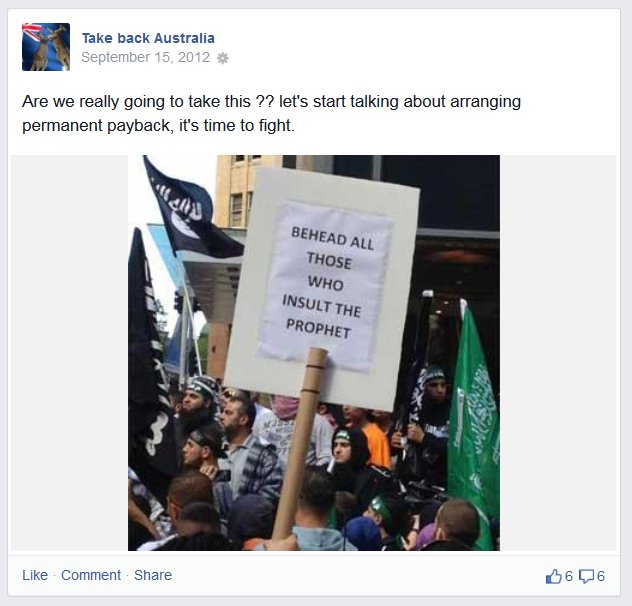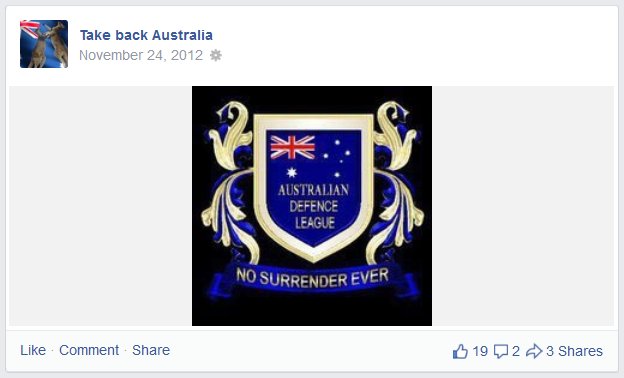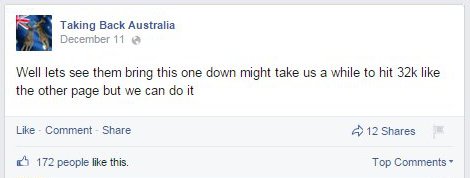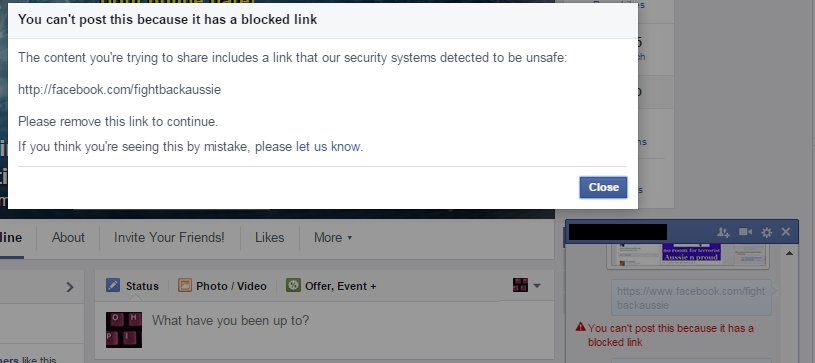On December 11th the Online Hate Prevention Institute claimed a major win, the closure of the Facebook hate page “Take Back Australia”. This briefing is not about the page, but about Facebook itself. It highlights how after banning the page, Facebook partially circumvented their own systems, putting public safety in Australia at risk, to impose their own values during a time of national crisis.
The active intervention by Facebook to foster “debate” in Australia is thoroughly shocking. The interventionist role of social media companies during the Arab Spring is well document, but to see such interventions imposed on a liberal democracy like Australia is a first. This intervention was over content that Facebook itself had evaluated and determined to be hate speech. It is over content Facebook had already found to breach its terms of service, and had already banned. How did someone on Facebook’s staff think it was appropriate to override their own protection mechanism in order to experiment with Australia? When will the staff member responsible for this decision be named, and how will they be held to account?
The circumvention allowing the banned page to be seen in Australia was removed earlier today. Questions however remain. Here’s what actually happened…
The “Take Back Australia” and “Taking Back Australia” pages
The Facebook hate page “Take Back Australia” (ID #261446097292220) was a hate page created in September 2012. As we demonstrated in a recent briefing, this page promoted xenophobia, religious vilification against Muslims, and misogyny. It was related to the Australian Defense League, itself an off shoot of the far right English Defense League. OHPI reported the page on October 2nd, a backup page called “taking back Australia” (ID # 763065747072290) was created on October 2nd.
The removal of “Take Back Australia”
On December 11th Facebook finally closed the “Take Back Australia” page. The backup page was promoted as the new main page, flaunting Facebook’s decision to stop this particular admin from spreading their hate. Some argue that closing pages is like playing whack-a-mole, a new one always pops up. The view of OHPI is that the closing such pages is important. Once they are closed their reach is reduced, and with it the amount of harm they can cause. This was recognized by the admin of Take Back Australia who stated that it would take a while to recover to their former size, and soon grew frustrated with the lack of growth and started a campaign, via petition, to have their page restored.
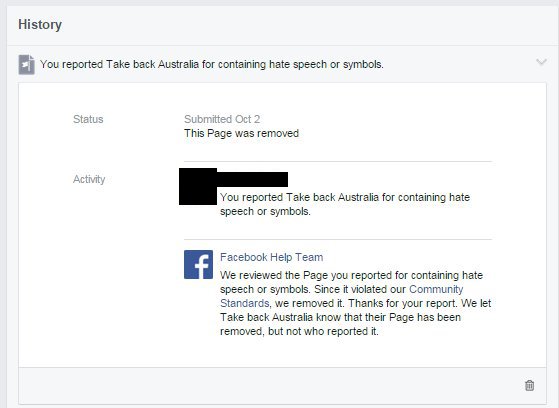
Facebook Flaunts Terms of Service
In a shocking move, some one at Facebook overrode the removal of the “Take Back Australia” page, allowing it to be seen in Australia but not in certain other countries such as India. The notification to users who had reported the page, which stated that Facebook had removed it, remained. Facebook also blocked links to the page, preventing it being shared, even by those who could see it. The block message (both in chat and in the pop up warning) clearly stated that the page was deemed unsafe. The visibility of the page in Australia was done by way of an exception to Facebook’s systems. OHPI can understand such overrides being used to promote democracy in countries which are not free, but to treat Australia this was is deeply insulting and a serious overreach for Facebook.
The lesson we need to learn
Imagine if Facebook ignored it’s own rules and restored content that they knew was inciting violence against an individual in the United States. Imagine they did so to, in their words, encourage “discussion” and “avoid censorship”. They would most likely end up before the Federal Communications Commission (the FCC) in addition to being sued by the individual concerned. In subverting their own rules, Facebook has flaunted Australian sovereignty, put the Australian public at risk, and taken advantage of a national crisis to promote their own agenda. The crisis is what appeared to be the first terrorist attack on home soil in Australia. Can you imagine if Facebook took a similar approach in the US in the days after September 11?
OHPI believes the flaunting of their own rules was not a move in favor of “freedom of speech” but rather served as a revenue grab. It was a way to make money now, and to creating a precedent to generate revenue during crises in the future. It was an experiment to see how much Facebook could get away with.
Facebook makes it’s money from ads. The more people go online, the more revenue Facebook can make. A national crisis that has everyone talking on social media increases profits. Having pages online which put the nation on the edge of riots in the streets, pages which a few go online to support, and many more go online to report, also increases revenues. Facebook doesn’t care about the nature of the discussion, they simply care that discussion is occurring. They care about this not for the value debate can bring to democracy, a debate which would be ill timed as victims are waiting to be buried, but for the revenue that advertising running on the pages where this debate occurs can generate. The pursuit of profits in this manner puts the public good of an inclusive society at risk. It also causes a risk to public safety, for example by raising tensions which can lead to riots. This is an abuse of the Australian public.
Governments must step in to stop social media companies taking such steps in the future. This incident in Australia was nothing more than an experiment to see how far Facebook can go, it should serve as a warning not only to the Australian Government, but to governments and people around the world. Facebook is not your friend.

